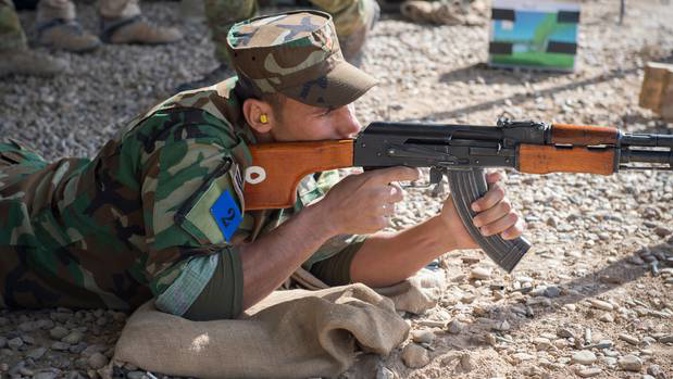
New Zealand's withdrawal from Iraq looks "inevitable" following Iranian missiles strikes against bases hosting United States troops, former Minister of Defence Wayne Mapp says.
The NZDF is, meanwhile, investigating claims New Zealand's base in Iraq has also been hit.
Deputy Prime Minister Winston Peters is now expected to issue a statement on the issue this afternoon.
United States officials have confirmed more than a dozen surface-to-surface missiles had been fired at two Iraqi military bases, with Iranian state television describing it as a revenge attack over the killing of top military commander Qassem Soleimani in an air strike by the United States.
Details of damage or injuries were not immediately available.
New Zealand currently has 45 Defence Force personnel stationed at Camp Taji, near the city, where they have trained Iraqi soldiers since 2015. Five more personnel are based in Baghdad.
The NZDF was on Wednesday afternoon investigating reports Taji had also been hit, an NZDF spokesman said.
The Government last year announced the mission would be withdrawing by June, 2020.
But concerns have been raised about the safety of New Zealand troops and that they could get caught up in Iranian strikes amid rising tension and rhetoric following Soleimani's killing.
New Zealand Defence Minister Ron Mark learned of the attack from media on Wednesday, with the news breaking as he spoke to reporters.
He declined to comment until he had been briefed.
Minutes earlier, Mark said while there were concerns about the situation, there were still no plans to immediately withdraw troops.
Asked if the Government would consider moving forward the end date, Mark said New Zealand would be assessing the situation and talking to other Coalition countries in Iraq.
"This is a case of coolly, calmly assessing the situation," he said.
That followed a Government announcement on Monday that New Zealand's training mission would be put on pause while personnel focused on defending their base.
Former Defence Minister Wayne Mapp said while he believed the prospect of all-out war between Iran and the United States was still unlikely, the latest round of strikes would fundamentally change the situation for New Zealand.
"It's going to start to feel altogether too risky relative to the gains," he said.
"The motivating reason to go there, Isis, is actually done."
Mapp said while New Zealand was unlikely to pull out immediately, the end date was now very likely to move.
"I would actually use the word inevitable. I think it's inevitable that we will pull out. The only question is when," he said.
New Zealand would act in the rest of the Coalition if it decided to pull out, Mapp said.
"It may be that the rest of the Coalition [excepting the US and UK] ends up saying pretty quickly: we're out of here."
"There will be a lot of dialogue going on now."
The most recent strikes came after six people from a medical convoy in the Iraqi militia the Popular Mobilisation Forces were killed in an airstrike near Camp Taji on Saturday.
Iraq's Prime Minister, Adil Abdul Mahdi, over the weekend described the US killing of Soleimani and eight others as a "political assassination" and called for a timetable to be set for the withdrawal of foreign forces.
Iraq's parliament has passed a resolution calling for foreign troops to be expelled.
Its Government would have to pass separate, binding legislation to end the agreement that allows foreign forces into the country.
Foreign Affairs Minister Winston Peters earlier joined calls for a de-escalation and restraint.
"The global coalition has worked very hard for its achievements in the fight against Isis. It is important that these gains are preserved and consolidated, not undermined," Peters said.
Take your Radio, Podcasts and Music with you









